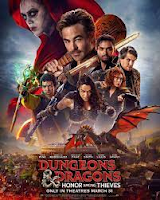J. J. Abrams' acolyte and talentless hack Damon Lindelof has been hit with a long expose that accuses him of racism and sexism during the production of Lost (2004-10), the show that should have ended mystery boxes but instead shoved them into everything else. I have no love for Lindelof, but unfortunately for those making these accusations they come at a time where this is so common my immediate reaction is doubt and suspicion. The stories are dated, so why put them out now? And if Lindelof has these inclinations, where are the accusations from his other productions? Is Vanity Fair claiming sexism and racism are easily sloughed off? I don't think fear of reprisals can be used as an excuse for silence since for the last five years the industry has been very open to them (and Lindelof's career has been on a downward arc during that period). This feels out of place after Lindelof efforts like the laughable Watchman (2019), whose reason d'etre was representation with a female lead (Wizards of the Coast really missed out with Aragorn, who shouldn't just be black, but also female). I believe the reason we're getting this story now is the industry wants to wash their hands of him, but because he has powerful friends they need justification (like the hamfisted excuses Marvel used to dump worthless executive Victoria Alonso, cf). Lindelof has barely produced anything over the last five years and hasn't had a true success since Lost. I have no idea if Lindelof was an actual bully or made racist or sexist comments, but validity aside, if the industry wants him to go away, I'm all for it.
As an aside, there are a lot of thematic similarities between this situation and what happened to Joss Whedon (specifically from Ray Fisher in regards to Justice League). By now it's accepted that Fisher's claims are at best overblown (that doesn't require you to believe the Zack Snyder conspiracy theory, although Zack is petty enough to make it plausible); but even the general accusations aimed at Whedon came long after the events themselves and are still controversial--so few people have come forward and the corroborating evidence is not strong (nor has it been tested in court), very unlike his self-admitted infidelities. This isn't a James Franco situation where the perpetrator admits what they did (Whedon's paramours, unlike Franco, have never accused him of wrong doing).
Credible rumour suggests Disney+ show Echo was such a mess that Marvel was forced to re-shoot most or all of it, and may cut down the episode count (form the original plan of eight, similar to what Netflix did to Witcher: Blood Origin). This fits with D+ changing course by dumping it all in one day (Netflix-style), something they've never done before. This is yet another IP no one asked for (which, like She-Hulk, will also feature Daredevil) and you have to wonder just how many failures like this can happen before Disney oligarch Bob Iger is in trouble. Speaking of Disney....
I don't care about The Little Mermaid one way or another (other than the original fairy tale from Hans Christian Andersen). The animated original is the last Disney film I saw in theaters on my own accord and I thought it was tepid and stupid even as a child (with admittedly catchy songs). I have, however, enjoyed the now typical dance this film has gone through: ESG casting (yet another redhead replaced by a black actor with no respect for the indigenous Danish people whose story this is) mixed with terrible decisions (special effects/writing) gets confronted by people wanting a good adaptation which is responded to with fan-baiting (if you don't like it, you're an -ist!).
That aside, live action remakes of animated Disney films seems like a bad idea--a very expensive way for Disney to try and double dip on a successful IP (unlike their old process of making direct-to-video sequels). These films cost a ton of money and since the only added content is BlackRock social engineering, the result irritates a portion of the audience which then aggravates the social divide. If you took the title away and simply described the events around this film, no one would have any idea which film was being discussed. The fact that none of these adaptations succeed (except Beauty and the Beast) is finally starting to harm the company, but they are so desperate for the ESG cash injection they can't stop themselves from doing it (that's worth emphasizing--the corporation doesn't care about these issues, they just want the money). Disney is suffering so much from doing this they are currently engaged in massive cost-saving measures (layoffs among them), but there's no sign they are making any effort to improve their products. None of this will change until the cost of receiving BlackRock money is less than the damage done to the brand (you'd think we'd have reached that point, but clearly not). As for the film itself, its opening underperformed (slightly lower than Ant-Man 3 when you cut out holiday Monday, while bombing overseas) and no one is expecting Guardians 3-like audience retention.
Charlie Cox, who was briefly in the disaster that was She-Hulk, has said a lot about the show before and after and it's worth looking at:
There are things that you do when you’re playing a superhero. There are scenes that you read, and you go, ‘The fans are going to love this. This is knock-out.’ And then there’s stuff like the walk of shame, where you’re like, ‘I don’t know. This could go two ways. This could be something that the fans really enjoy, and it could be something that feels like it goes against the nature of what they love about the character and the tone of the piece.' The good thing about doing it on something like She-Hulk is, it’s not Daredevil’s show. It was my job as the actor to come onto another person’s show and embrace the tone, whilst staying as true to the character as I possibly could. In this world, Matt’s in LA, and he lets his hair down a little bit. He’s just having fun. He’s killing it in the courtroom. You know, he has a fling with a really beautiful and charismatic lawyer. And then they get to do some superhero stuff. It tonally felt very different from everything I’ve done as that character, but that was also really exciting and new and different and in keeping with the character. If you read the comics, there are a series of Daredevil comics where the tone is much lighter, and he is much more kind of silly and goofy than perhaps we’ve done much of previously with this character. You can’t please all the people all the time. If She-Hulk’s not your thing, then don’t watch it. Watch something else.And so when She-Hulk came along and I read those scripts, I felt like this is a really good opportunity to try my hand at that tone with this character and see if I can remain true to the character but also find a side of him that is represented in the comics that would be appropriate for that show. Because the problem is if you take the Daredevil that we know from the other series and you put him in She-Hulk, I think he becomes the butt of the joke. He’s the serious one and everyone – so, I didn’t want that. I don’t think he’s that. So I wanted him to match Jennifer Waters a little bit and that experiment for me was really fun. And I think people responded to that. I actually also haven’t seen that episode. I’ve seen the bits from when we do the ADR, which is the voiceover stuff and it seems fun, you know what I mean? But it was a really cool experiment to see if you could take that character and without losing anything – losing what people love about that character, what I love about that character – and still see him in different places. It’s also true to life. There are times in your life when you find it very difficult to find a sense of humor because you’re struggling or because life is hard, and there’s times when life’s running smoothly and it’s sunglasses and roses.
Apparently Cox took his own advice: if She-Hulk is not your thing, don't watch it. I feel for Cox, as he can't overtly say anything negative about the show, but there are plenty of clues that he's well aware of how bad it was (Simon Pegg's video praising it remains a highlight of hilarity). It's telling that Cox compared his character in the show to the forgotten era of Daredevil when he was 'silly' (his unpopular in the 60s and 70s run, prior to the grounded breakthrough that Cox portrayed in the Netflix show). What I think he's saying in a coded way is that he read the horrendous scripts from Jessica Gao and wanted this iteration to be as far removed from his excellent prior work as possible--if you're looking for the Daredevil you loved, don't watch this show, wink-wink. We've had similar comments from Vincent D'Onfrio about Kingpin in Hawkeye--this isn't the Netflix version--no shit.
Writer's Strike
I haven't been commenting on the writer's strike because it's not holding up anything I want to see. One positive that may come from it is various projects no one wants could get cancelled (fingers crossed), with the strike serving as an easy 'out' for the executives who initially approved them. I'm curious to see what sort of meltdown is happening among corporate execs who are watching Bud Light burn up like the Hindenburg. My guess is they'll see it as an isolated example unless Target, Miller, and others suffer a similar fate.
This article was written by Peter Levi






















